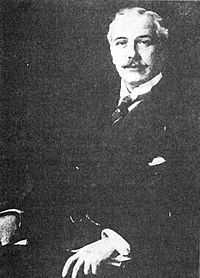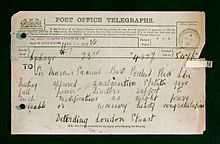Henri Deterding

Henri Wilhelm August Deterding KBE (Hon), (19 April 1866, Amsterdam – 4 February 1939, St. Moritz) was one of the first executives of the Royal Dutch Petroleum Company and for 36 years (1900–1936) its chairman and the chairman of the combined Royal Dutch/Shell oil company. He came to power after the early death of the Royal Dutch's original leader, Jean Baptiste August Kessler. He made it to the runner up against John D. Rockefeller's Standard Oil and it is still one of the world's largest petroleum companies. He was made an honorary KBE in 1920, ostensibly for service to Anglo-Dutch relations, but mainly for his work supplying Allies with petroleum during World War I.

Called the "Napoleon of Oil", Deterding was responsible for developing the tanker fleet that let Royal Dutch compete with the Shell company of Marcus Samuel. He led Royal Dutch to several major mergers and acquisitions, including a merger with Samuel's "Shell" Transport and Trading Company in 1907 and the purchase of Azerbaijan oil fields from the Rothschild family in 1911. In the last years of his life, Deterding became controversial when he became an admirer of the German Nazi party. In 1936, he discussed with them the sale of a year's oil reserves on credit; the next year, he was forced to resign from the company's board.
In 1936 he bought the manor of Dobbin near Krakow am See, (Germany) and moved to that place. After he died in Switzerland he was buried at Dobbin in Mecklenburg,[1] but his body was transferred to a grave in Liechtenstein in 1968.[2]
Deterding was married three times (resp. to Catharina Neubronner, Lydia Koudoyaroff and to Charlotte Knaack) and had seven children, among whom was the socialite Olga Deterding. During his marriage to his second wife, his English estate was Buckhurst Park at Winkfield in Berkshire, where she continued to live with her two daughthers after their divorce.
Erroneous Death Notice
The British newspaper the Daily Mail erroneously published his obituary on 27 June 1924, with the news being copied by The New York Times.[3]
That same day however, the Dutch envoy in London René de Marees van Swinderen noted in a letter to the Dutch foreign minister Herman Adriaan van Karnebeek:"P.S. Ik kon de verleiding niet weerstaan om hierbij in te sluiten de necrologie door de Daily Mail heden gewijd aan den gelukkig springlevenden Deterding."
(Translation: "P.S. I could not resist adding hereby the obituary dedicated by the Daily Mail to Deterding, who is fortunately very much alive.")[4]
Deterding died in 1939.
See also
- The Prize: The Epic Quest for Oil, Money, and Power
- List of honorary British Knights
References
- ↑ http://royaldutchshellplc.com/2010/11/06/royal-dutch-shell-nazi-secrets-part-1-the-funeral/
- ↑ Angelika Schmiegelow-Powell, "Güstrow im Umbruch", Edition Temmen 2003 ISBN 3-86108-392-2
- ↑ New York Times, 28 June 1924, p.15. "Henry Deterding dies at film show; Director General of the Royal Dutch Company Succumbs Suddenly in The Hague.". Last checked on 27 June 2010.
- ↑ Documenten betreffende de buitenlandse politiek van Nederland 1919-1945 Deel V 1923-1924, Rijks Geschiedkundige Publicatiën Grote Serie 192, 's-Gravenhage 1985 (Documents concerning foreign policy of the Netherlands 1919-1945 Part V 1923-1924, National Historical Publications Grote Series no. 192, The Hague 1985); Document no. 284, page 552.
Further reading
- Paul Hendrix (2002). Sir Henri Deterding and Royal Dutch–Shell: Changing Control of World Oil, 1900–1940. Bristol Academic Press. ISBN 0-9513762-8-4.
|